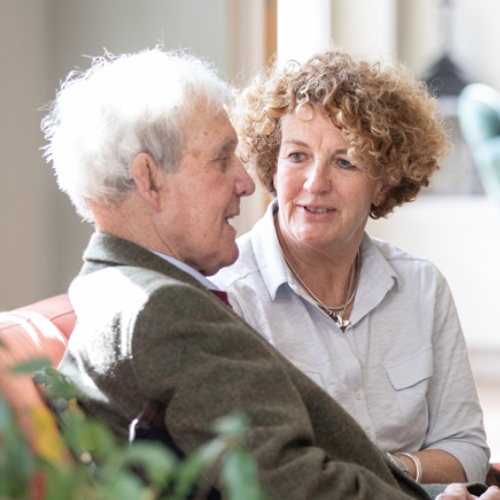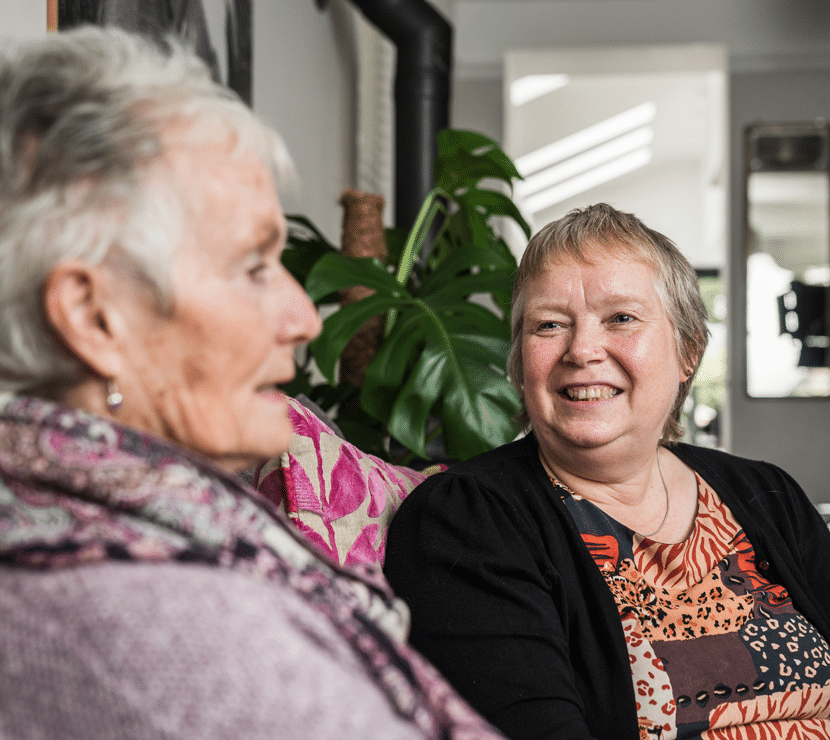Glaucoma is a common eye condition that damages your eye’s optic nerve. It often runs and families and most commonly occurs later on in life.
Glaucoma is often called “the silent thief of sight” because many people with glaucoma have no early symptoms or pain. This is why it is especially important that anyone that looks after older adults is able to recognise the warning signs and symptoms. Catching glaucoma symptoms before they progress can help prevent permanent vision loss and blindness.
Here are the effects and early symptoms of glaucoma so that you know what to look for to keep you and your loved ones safe.
WHAT IS GLAUCOMA?
Glaucoma is a group of conditions that damage the optic nerve of the eye. As this nerve gradually deteriorates, blind spots develop in your vision. If this damage persists, glaucoma can cause permanent vision loss or even total blindness.
This damage to the optic nerve is often caused by abnormally high pressure in the eye. Most types of glaucoma are hereditary. When the condition is not hereditary, doctors don’t fully understand what causes this pressure to build.
Glaucoma is one of the leading causes of vision loss and permanent blindness in people over 60. Although the effects of glaucoma can occur at any age, it is most common in older adults.
It is possible to have glaucoma and not know it. The only way to find out if you have glaucoma is to get a comprehensive dilated eye exam. Visit your eye doctor regularly so they can test for glaucoma and manage existing symptoms before long-term vision loss occurs.
TYPES OF GLAUCOMA
There are several types of glaucoma, including:
- Open-angle glaucoma. This is the most common form of glaucoma. It occurs when tiny deposits build up in the eye’s drainage canals, slowly clogging them. Despite this blockage, the canals may appear to be functioning normally.
- Angle-closure glaucoma. This form of glaucoma occurs when the eye doesn’t drain as it should because the drain space between your iris and cornea becomes too narrow. This leads to increased pressure in the eye and eventually vision loss. This form of glaucoma is also associated with cataracts and farsightedness.
- Normal-tension glaucoma. Some people suffer from optic nerve damage despite their eye pressure being normal or not very high. Experts still do not understand the cause of this normal-tension glaucoma.
- Pigmentary glaucoma. With this form of glaucoma, tiny bits of pigment from your iris get into the fluid inside your eye and block the drainage canals leading to increased pressure and eventually vision loss.
SYMPTOMS OF GLAUCOMA
The early signs of glaucoma are subtle and easy to miss. Many people with glaucoma do not have any symptoms at all. Only the symptoms of angle-closure glaucoma often occur quickly and are more obvious.
If you notice any of these symptoms of glaucoma, seek medical care as soon as possible:
- Seeing halos around lights
- Redness in your eye
- Visual disturbances or vision loss
- An eye that looks hazy
- Upset stomach or vomiting
- Eye pain
MANAGING GLAUCOMA SYMPTOMS AT HOME
Glaucoma is a lifelong condition The longer glaucoma is left untreated, the faster it can lead to permanent vision loss and blindness.
Whilst treatments can slow down further vision loss, they cannot restore the vision loss that has already occurred. This is why it is so important to seek treatment as soon as you notice any symptoms of glaucoma.
Although the effects of glaucoma on everyday life can be challenging, there are some lifestyle changes that can help you manage symptoms and keep your eyes healthy:
- Get moving. Regular exercise can help you stay healthy and keep blood flowing to the nerves in your eye. Speak to your GP to discuss the best exercise program for you.
- Eat healthy and nutritious foods. Eating a healthy and well-rounded diet is important for maintaining overall body and eye health.
- Take your medication. Be sure to take your medication and eye drops as directed. Failing to take your medication properly can cause your glaucoma to worsen.
- Protect your eyes. Avoid rubbing your eyes as this can make your symptoms worse. Always wear sunglasses while outside and protective glasses if you work in the yard or play sports.
- Elevate your head. Keeping your head slightly elevated as you sleep can help lower eye pressure.
- Avoid caffeine. Moderate your consumption of tea, coffee and soft drinks as they can considerably raise your eye pressure.
- Adapt your home. Speak to your GP or occupational therapist about home adaptations that will make your home safer. These can include adjusting lighting, marking steps and slopes and decluttering.
OUR PERSONALISED LIVE-IN CARE SERVICE
If you are living with glaucoma or any other health concern that limits your ability to live independently, our dedicated carers can help.
Our home care service can help you manage your symptoms and enjoy a better quality of life despite the challenges that your condition brings. By moving into your home with you, our experienced live-in carers will be there to provide you with the one-to-one support you need to reduce the impact of your symptoms and avoid unnecessary hospital admissions.
There are countless life-enriching benefits to staying at home with a highly trained and experienced carer who is dedicated to you, instead of facing the upset and worry of moving into a care or nursing home. With an Oxford Aunts carer you will be able to live life your way with a tailored plan of care delivered by a compassionate carer on a one-to-one basis.
HOW CAN LIVE-IN CARE BENEFIT THOSE WITH GLAUCOMA?
Receiving care at home can help you retain your independence and allow you to continue living happily in your own home despite the challenges glaucoma and other health concerns present. Here are just some of the benefits of receiving live-in care:
- Living an active lifestyle filled with physical activity and healthy, nourishing foods can help manage the symptoms of glaucoma. Our carers will be more than happy to encourage and support you in building or maintaining healthy habits.
- Support for a number of day-to-day tasks from discreet and sensitive personal care to cooking and meal planning
- A level of unrivalled and dedicated support that is hard to achieve in other care settings
Providing safe mobility assistance such as transferring between beds, wheelchairs, and other seating options - Helping your render your home a safer environment by removing clutter and suggesting mobility aids and home adaptations that can reduce your risk for slips and falls.
- If you are no longer able to drive, a carer can provide assistance with running errands
- The physical symptoms associated with living with glaucoma may cause you to feel anxious or isolated at times. Our compassionate live-in carers are there to provide you with companionship and friendship, if and when you need it.
OUR HIGH-QUALITY LIVE-IN CARE SERVICE INCLUDES:
- A comprehensive assessment of your needs – our assessment will address not just your care needs but how you wish to live your life
- Careful matching of an experienced and dedicated carer who will meet all your needs
- A highly-tailored care plan created using a multidisciplinary approach in consultation with other healthcare professionals and community organisations involved in your care, as well as where appropriate your family members or loved ones
- Unrivalled support from a team of two care managements experts local to you
- Domestic and household tasks
- Cooking, meal planning, shopping and preparation
- 24-hours a day out-of-hours emergency support should you need it
GET IN TOUCH WITH US ABOUT YOUR CARE NEEDS
At the heart of our personal care is enabling people to live well in their own homes with the care and support they need from a carefully well-matched, trained and dedicated carer. With an Oxford Aunts personal care assistant you can be reassured that you are receiving high-quality care that is based on mutual respect and dignity.
Our expert care advisors are here to help you understand the options available to you.





